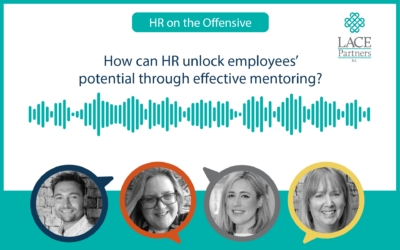A few weeks ago, we held our latest LACE Partners HR Shared Services forum, where we brought together likeminded HR shared services leaders across global organisations to network, share ideas and discuss latest trends. In this blog, we’ve summarised some of the key discussion points from our conversation, which build upon the findings from our recently launched HR Shared Services Trends 2022 report.
Are we doing enough to support the development of our teams, challenging traditional perceptions of working in HRSS?
Attracting talent
- Challenges in attracting talent are evident across all levels. The pressure to uplift base salaries to accommodate the rise in inflation is playing a part, but so too is the historical undervaluing of the HRSS function.
- There is still a perception that HR Shared Services isn’t ‘cool’, that it’s the stepping stone to other parts of HR. It can also be seen as ‘the mailbox’ – i.e. taking queries and passing them on. We need to change these perceptions to compete for the best and diverse talent, but how do we do that?
- There was consensus in the room for a greater focus on thinking outside the box when it comes to hiring plans. For example, how many organisations are targeting people who have the skills for shared services but are not from the traditional backgrounds?
Developing talent
- Given that HRSS is often the ‘first contact’ – from an experience perspective, do you want an employee’s first contact being an entry level individual in the team who doesn’t have the knowledge of different parts of the business giving advice, or should this be someone who’s more highly skilled? In essence, perhaps this traditional career model needs turning on its head to deliver the best experience for employees when they support the most.
- One member spoke about how their business has a development programme for HRBPs, where they have to complete a rotation across the business, including in the HRSS team. This allowed the HRBPs to really appreciate the challenges the HRSS advisors faced (as much as understand what the teams really did and how), thereby helping foster more collaborative ways of working when the HRBPs were back in their business facing roles. However, how many businesses have formal / structured training plans and career paths in HRSS? Is there enough focus around professionalising HRSS?
The importance of effective leadership and building ‘grass roots’ cultures
- The group talked about the role that HRSS leaders play in supporting their teams, creating the right working environment and culture (i.e. a supportive one) and how this can start to change external perceptions of HRSS.
- The power you have as a leader to embrace ideas, making people feel listened to, is something that should not be underestimated. One leader shared an example of taking the ideas from teams in the Bangalore office and rolling them out across the rest of the business. This was the first time that team had had such engagement. The knock-on effects of that team feeling like they were being listened to was invaluable, as it helped to drive their productivity and engagement – in addition to the idea having an organsiation-wide impact.
- Some leaders had experienced challenges with measuring productivity during COVID. One member talked about not hearing about an issue involving a junior member of staff, only coming to a head when that member of staff came to him directly after the situation had escalated. Would that have happened in the office pre-pandemic? How do we build effective forums in a hybrid world where people feel safe and able to raise issues in the moment, versus when it’s potentially too late?
- Building culture at a local level is as important as having an overarching ‘this is our culture as a company’ approach.
What do we really mean by ‘continuous improvement’ (CI) and what’s holding us back?
- Is there a lack of understanding as to what CI actually is? Many assume it’s about automating processes, but it can also be about process improvements, for example. In addition, how many people think of CI when they’ve launched a new piece of technology? How many organisations realise that there are also investment requirements after launch?
- Attendees discussed who is undertaking CI and how it manifests itself in their businesses. For example, some had dedicated CI teams, although in times of cost pressure and headcount reduction this resource often came under scrutiny and could be seen as a ‘nice to have’ by others externally. Others had taken a different approach – for example, one leader talked about how they had created an ’innovation fund’, which was designed to drive creativity amongst teams and defined during the annual budget and planning processes. Through focusing on CI, one organisation had saved 1 million hours of activity for the business, allowing employees and line managers to focus on more important things – so there is clear value in CI if done right.
- What’s holding us back? There was a question around mindset – i.e. the need to have people who are curious thinkers in order to move forward in driving CI. In addition, so many businesses lack the capacity to reflect and drive CI (or there is at least a perception of a lack of capacity).
Is anybody using artificial intelligence (AI)?
- Consensus was that it was limited. One company was using AI tools in the talent space for internal mobility, to identify skills and people who could transfer across to different teams. In this example, the move to a new AI-enabled talent platform had resulted in over 60% of talent profiles being complete versus 7% previously in the core HCM. However, their journey was in the infancy stages from an external hire perspective. The expectation was that it could take between three to five years before the team get to the stage that they are comfortable.
Outsourcing
- Outsourcing was a key debate amongst members, particularly looking at businesses that have peaks of demand for their talent at specific points in the year. Outsourcing is a viable option for some businesses that need the flexibility of services and resources (e.g. holiday season, etc)
- A debate took place with regards to how outsourcing impacts culture, specifically with regards to talent acquisition but on a wider scale too. Is culture a key driver behind wanting to bring more services in-house versus outsourcing?
- What is our HRSS forum’s experience of using RPOs? Some HRSS leaders have moved away from a reliance on RPOs due to a lack of control in how they articulate the offering to candidates. Others said they are looking at bringing talent acquisition teams in-house, but are recruiting from the RPO themselves, as teams want to be able to focus on one customer so they can get the candidate’s experience as robust and efficient as possible.
- There was also an interesting debate around whether employee relations fits into the scope of HRSS. One member talked about how they are considering outsourcing this, with some case management technology providers in the market like AdviserPlus, CaseFlowHR, or ESP HR all mentioned as marketplace providers being explored.
If you’d like to find out more about the HR Shared Services whitepapers we have produced, you can do so via the Whitepapers search in the filter. If you are interested in the forum then use the contact form below and we’ll get back in touch.






